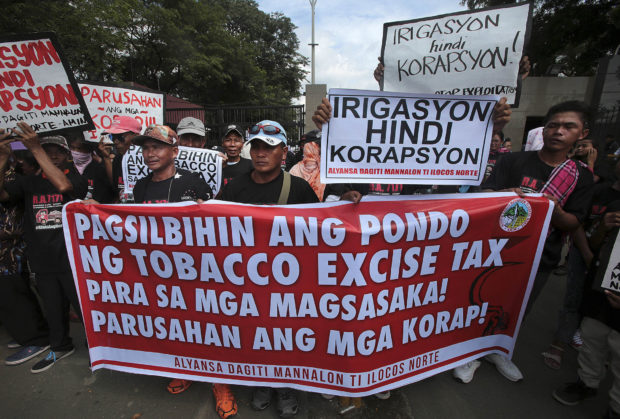Congress raises tax on fuel, cars, tobacco

TOBACCO TAX Farmers call for the proper use of the excise tax on tobacco,which was placed at P32.50 per pack effective Jan. 1, 2018, to June 30, 2018, under the tax reform deal approved by the Senate-House conference committee. The tax would go up to P35 effective July 1, 2018, to Dec. 31, 2019, and then to P37.50 for the next 24 months, then to P40 for the next 24 months,with the rates going up 4 percent every year thereafter. —GRIG C. MONTEGRANDE
Personal income tax of salary-earners has been lowered but the excise tax on a host of goods and services such as automobiles, tobacco, coal, oil products and cosmetic procedures, has been increased under the Tax Reform for Acceleration and Inclusion (TRAIN) bill that both chambers of Congress are set to ratify today.
Today is the last regular session of Congress before it goes on a holiday break starting Dec. 15.
On Monday, the Senate and the House of Representatives settled all contentious points in the tax reform package during negotiations in the bicameral conference committee, which had stalled as a result of disagreements over the additional tax rate on, among other items, mining resources, tobacco, petroleum and coal.
Under the final version of the TRAIN bill, those earning an annual income of P250,000 would be exempt from paying income tax, while those with higher earnings would be taxed at staggered rates.
The 13th month pay and other bonuses of up to P90,000 would not be taxed under the bill.
But the reduction in personal taxes would be offset by higher taxes on other commodities, chief of which are fuel and petroleum products.
Regular unleaded and premium gasoline would be taxed P7 per liter in 2018, P9 per liter in 2019, and P10 per liter from 2020 onward.
For 2018, the rates for other petroleum products would be: P4 for Avgas, P8 for asphalts, P3 for kerosene, P2.50 for diesel, P1 for liquefied petroleum gas, P7 for naphtha, P8 for refined fuel, P2.50 for bunker fuel, P8 for lubricating oil, P8 for paraffin wax and P2.50 for petroleum coke.
“All petroleum products used as input, feedstock, raw materials for petrochemicals and refining or as replacement fuel are exempt,” Majority Leader Rodolfo Fariñas said, quoting the House ways and means committee chair, Rep. Dakila Cua.
Brand-new cars
Car buyers would also bear a heavier tax burden the more expensive the vehicle they intend to purchase.
Tax rates would be raised to 4 percent for brand-new vehicles costing P600,000 and below; 10 percent for those between P600,000 and P1 million; 20 percent for those between P1 million and P4 million; and 50 percent for vehicles worth over P4 million.
The TRAIN bill would seek to levy a P6 tax per liter of beverages using caloric and noncaloric sweeteners, and P12 per liter for beverages using high fructose corn syrup.
Milk, coffee and 100-percent natural fruit juices are excluded.
Mining
On mining, the Senate and House contingents agreed to “double the rates” of excise taxes on metallic and nonmetallic mining resources from 2 percent to 4 percent.
Tobacco excise tax was placed at P32.50 per pack effective Jan. 1, 2018, to June 30, 2018, which would go up to P35 effective July 1, 2018, to Dec. 31, 2019, and then to P37.50 for the next 24 months, then to P40 for the next 24 months, with the rates going up 4 percent every year thereafter.
Cosmetic procedures, coal
The two chambers also agreed to tax cosmetic procedures by 5 percent.
The Senate’s proposed additional tax on coal was halved from the original P300 by 2020. It was pegged at P50 in 2018, P100 in 2019, and P150 in 2020.
The rates spell a 400 percent, 900 percent and 1,400 percent increase, respectively, from the original tax rate of P10 per metric ton of coal, which has remained the same since 1977.
Environmental groups lauded the passage on the bicameral committee of the increase in the coal tax.
Speaker Pantaleon Alvarez, who was initially opposed to the tax on coal, admitted a change of heart.
“At first I was against it. But of course, I can’t always get my way. I think there’s also a good reason to adjust the tax rate,” he said, noting that it had been decades since it was changed.
‘Poor not affected directly’
Alvarez defended the new or additional taxes in the final version, saying the poor would not be hit heavily.
“Many of the poor do not pay tax because they are exempt. Many may be hit by increased prices of food and other products, but they will not be affected directly,” he said at a press briefing.
In its first year of implementation, the proposed first tax reform package is expected to result in a net gain of at least P130 billion, Finance Secretary Carlos Dominguez III said on Tuesday.
“We’re now ready for the TRAIN to leave the station,” Dominguez told reporters after the bicameral committee approved its consolidated version of the tax package.
Routed for signatures
Senate Majority Leader Vicente Sotto III said on Tuesday night that the bicameral conference committee report on the TRAIN bill was still being routed for signatures to the conference committee members.
The Senate and House were supposed to ratify the reconciled bill on Tuesday so that it could be signed on
Dec. 29 by President Duterte. The new tax measure was
expected to take effect on Jan. 1, 2018.
Sotto said it was still possible for the Senate to ratify the measure on Wednesday. But this depended if certain issues in the bicam report are “straightened out,” he said. —With reports from Ben O. de Vera and Jaymee T. Gamil














